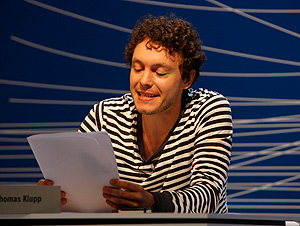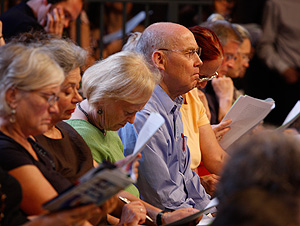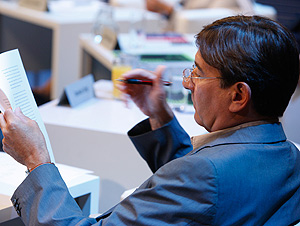 Thomas Klupp (Bild: Johannes Puch)
Thomas Klupp (Bild: Johannes Puch)
Thomas Klupp (D), Jury discussion
Thomas Klupp read the text "9to5 Hardcore" at the invitation of Hubert Winkels. The jury was not convinced by the story of a man, who views internet porn in the service of science.
 Thomas Klupp (Bild: Johannes Puch)
Thomas Klupp (Bild: Johannes Puch)
Video portrait
Reading
Discussion
The readings of the Bachmann Prize 2011 went into the final round with "9to5 Hardcore", a text from the German author Thomas Klupp. The jury really went to work on the last author of this year, though the discussion in the end focused on the satire.
Pornographic viewing for the service of science
Invited by Hubert Winkels, Klupp's text tells of a scientific employee of a cultural institution, who must, as part of a contract, watch pornographic material from morning to night in order to research the "explicit production strategies" on the internet; he dreams of a permanent position as well as female genitals and tries not to lose control.
 Publikum (Bild: Johannes Puch)
Publikum (Bild: Johannes Puch)
Feßmann: "Ever increasing stimuli in order to please"
"A funny text - at the beginning", said Meike Feßman in her introduction. This is about a satire in the cultural-scientific domain, on porn consumption, men and women, the gender issue and the obedience of a whole generation that does anything expected of it. In some way, the main character prostitutes himself - as, however, does the text itself, which relies on ever increasing stimuli in order to please.
One could hear in the hall how the laughter of the audience became noticeably less towards the end, said Feßmann. "Funny and amusing", but the text had its limits, because it is limited to the language of its protagonist and therefore could not go beyond the limits of its internal conflict.
 Alain Claude Sulzer (Bild: Johannes Puch)
Alain Claude Sulzer (Bild: Johannes Puch)
Keller: "Break on page 11"
Hildegard E. Keller found this "funny and hybrid text" to be perhaps a kind of "social report for the DFB". A man is making himself accountable for his actions, which is elegantly done until an abrupt change on page 11: the careerism of the character moves to the background, and one is presented with a different sort of character. One asks oneself what keeps the character in this position, who may in consequence become a "banal minor official".
"The break doesn't quite work", said Keller. The protagonist suffers from the irrelevance of his task, but still wants to continue.
Jandl quickly bored
"Professor Faulstich [lazy jab] - the name says it all", said Paul Jandl, who was quickly "bored" by the text. It is easy to predict how the text will continue as it is neither satirically "very productive" nor particularly ideologically critical. "I find it banal - sorry."
Strigl: "Satire with a confessional flavour"
Daniela Strigl didn't find it boring, coming herself from the scientific world, where the satire - in view of the unscrupulous way cultural science is handled - is shown here "without great exaggeration". The text has a confessional flavour, basically a "great idea", however the problem is that the character, as a "personalized strategy" within the world of science, is far too over-adapted and willing to consent to everything - he should be much more "subversive", said Strigl.
Spinnen sees no better world
It is bad for a satire when it can be said that its object (NB: the scientific enterprise) cannot be exaggerated, said Burkhard Spinnen. He had learned that the satire is a "negative Utopia"- a better world must be seen as at least conceivable, but this was not the case here.
Sulzer: "True contradictions"
"In the beginning was the idea, then the character came afterwards", said Alain Claude Sulzer. The idea gave the text its cover, though Sulzer believes he has identified "true contradictions", though nothing that editing could not eliminate. The joke was "spread out" here over the reading time of 25 minutes
Winkels tired of his colleagues' criticism
"Exhausted" by everything he had heard (it was all a little "paralysing") juror Hubert Winkels started a comprehensive analysis of the text. This role prose is comparable to that of Leif Randt, the language carries over to the world described: "it wants to engage and de-individualise, that is its intention", said Winkels. "The protagonist dissolves into nothing". He did not want to "start from the beginning", said Winkels said rather brusquely, given the lack of sympathy for " his author".
Meike Feßmannm stuck to her opinion: "The text is bad, the jokes get cheaper". Daniela Strigl noted approvingly before the end of the discussion that there has been some good satire this year - also from Germany.
Barbara Johanna Frank
 TDDL 2011
TDDL 2011